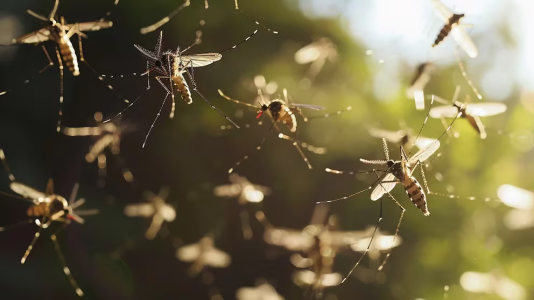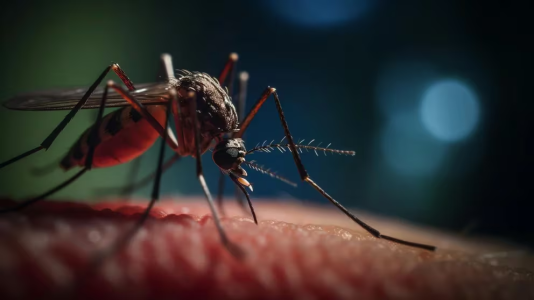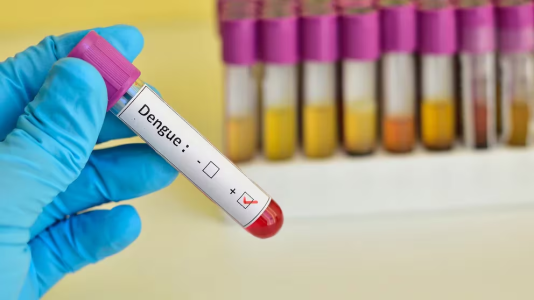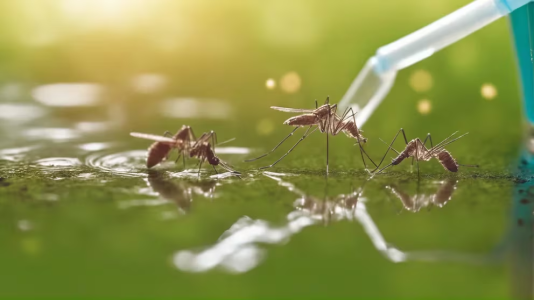All the Answers
Well-known member
Are dengue cases going down in Argentina? What the experts say - Infobae

Source:

¿Están bajando los casos de dengue en Argentina? Qué dicen los expertos
El Ministerio de Salud informó que en los últimos 14 días hubo un descenso en el número de contagios semanales. Las razones detrás de esta dinámica y qué podría pasar en los próximos meses, de acuerdo a tres especialistas consultados por Infobae
April 23, 2024
The Ministry of Health reported that in the last 14 days there was a decrease in the number of weekly infections. The reasons behind this dynamic and what could happen in the coming months, according to three specialists consulted by Infobae
By Fermín Filloy

This dengue season has set a record in infections, notably exceeding the figures of the previous year, which closed with 130 thousand reported cases (Illustrative Image Infobae)
The dengue outbreak in Argentina has so far recorded 333,084 people affected and 238 deaths. These data were recorded, according to the Ministry of Health, between the end of July 2023 and mid-April 2024. With these figures, this season is a record due to the number of infections and deaths . Just to draw a parallel, it exceeded the numbers from last year's measurement, with 130 thousand reported cases and 65 deaths between July 2022 and the same month in 2023.
However, in the latest Epidemiological Bulletin they specified that “ a gradual national trend of decreasing cases since week 13 of 2024 (end of March )” is observed . “In the analysis of the dengue epidemic curve at the country level, the peak so far is recorded in week 12 of 2024 (mid-March), with 47,092 cases, from which a decrease in the number of weekly cases is identified. for 2 consecutive weeks (the percentage variation between week 14 and week 12 is 21%)”, they indicated.
At the same time, they called for “the cases of recent weeks to be taken with caution because they can be modified according to the successive integration of information by the notifiers.”
Beyond the fact that there are still several weeks left to conclude this year's epidemiological surveillance, the latest information from the health portfolio raised a series of concerns: are dengue cases decreasing? If so, why? Infobae consulted experts to answer these questions about the viral disease transmitted by the Aedes aegypti mosquito.

The decrease in cases could be related to temperature variations, since the dengue-transmitting mosquito, Aedes aegypti, is more active in warm and humid climates (Illustrative image Infobae)
According to the Ministry of Health, this trend of decreasing cases “on the curve for the entire country is fundamentally driven by the behavior observed in the Center region, which has a curve similar in format to that of the entire country and contributes the highest number of cases, while in the other regions the behavior is different.”
In that sense, first of all, Florencia Troglio (MN 107,998), an infectious disease doctor and member of the Emerging and Endemic Diseases Commission of the Argentine Society of Infectology (SADI), told Infobae : “The decrease in cases surely has a direct relationship with temperatures . The activity of the Aedes aegypti mosquito , which transmits the disease, is directly proportional to temperatures and humidity. The mosquito is more active and bites more when it is hot. Furthermore, the extrinsic incubation period, which is the time it takes for the mosquito to become infective, that is, to bite a person and be able to transmit the virus, is also lengthened when it is cold. In these last few weeks, across the country, there were lower temperatures, so it probably has to do with that.”
In any case, according to Troglio, “ we have to be cautious.” Because? This is how he explained it: “The dengue season has not closed, it ends in week 30 of 2024. That is, there are still 15 weeks left . And, on the other hand, the notification of cases always has a small delay. “We are in a year marked by the El Niño Phenomenon and it is estimated that its effects may extend until the end of May or June.”
It should be remembered that the El Niño Phenomenon is a natural event characterized by the fluctuation of ocean temperatures in the central and eastern part of the equatorial Pacific, associated with changes in the atmosphere. It has a great influence on climatic conditions in various parts of the world and tends to register higher than normal rainfall, according to the National Meteorological Service.

It is crucial to observe whether the transmission of the dengue virus continues throughout the year in other regions of the country (Getty)
Secondly, the infectious disease specialist postulated that we must observe “ if there is transmission of the dengue virus throughout the year in other regions of the country. Last year, the northeastern region of Argentina, although the number of cases decreased in winter, had transmission throughout the year.”
In turn, consulted by Infobae, the infectologist Tomás Orduna (MP 30.128), head of the Tropical Medicine and Travel Medicine Service at the FJ Muñiz Infectious Diseases Hospital and member of the scientific committee of the Mundo Sano Foundation , contributed: “The decline of dengue cases that have been recorded in the last three weeks shows us a behavior that, since the beginning of April, is similar to what has happened in past seasons. Generally, the peak of transmission has been between the first weeks of March and the first weeks of April, sometimes shifting a little towards March and other times a little more towards April. But this current decline in behavior is accompanied by some issues that may favor it. For example, the high transmission of dengue reduces the number of susceptible people due to the intense transmission that has occurred.”
"Let us remember that, in addition to the registered symptomatic cases - Orduna expanded - there are unregistered symptomatic cases and a huge component of asymptomatic cases that initially generate a kind of refractoriness, to which are added the changing meteorological conditions with the incipient autumn, which "It has meant that for several days there have been conditions that are not suitable or favorable for the continuity of mosquito activity."
For his part, Rogelio Pizzi, (MP 30.128), dean of the Faculty of Medical Sciences of the National University of Córdoba (UNC) and head of the Latin American and Caribbean Association of Faculties and Schools of Medicine (Alafem), analyzed in dialogue with Infobae: “ The peak of cases in week 12 was reflected after Easter due to the great mobility and tourism that existed. What is the reason for the drop in cases now? Some colder temperatures are coming and that is not conducive to mosquito activity. Cold days are not conducive to a mosquito from tropical or subtropical tropical environments like this one, with warm temperatures and humidity and rainfall regimes. The Aedes aegypti, at temperatures of less than 15 degrees, loses its activity. However, it must be clarified that the number of cases that is reflected today, there is a large number, an under-reporting of cases, that are not documented."

Mosquito eggs can remain viable for a year in adverse conditions according to Rogelio Pizzi (Illustrative image Infobae)
“There is no need to relax because now we see again that high temperatures are returning. On the weekend, for example, in Córdoba, 32 degrees were recorded. So you have to be careful and remember that mosquito eggs in adverse temperatures or adverse environmental conditions can be viable for up to a year. Therefore, if the cold comes now and then the heat returns, that egg can be active and hatch,” Pizzi asserted.
And he added: “Mosquito activity drops, as we said, below 15 degrees of temperature, but that temperature has to be sustained for at least 15 days. That is why we must not relax: we must take care of ourselves and continue taking care of ourselves and taking all the health measures issued by the Ministry of Health of the Nation and the provincial governments. The cases will continue to decrease as long as we comply with all health regulations.”
How to prevent dengue?
To prevent dengue, it is essential to eliminate places where mosquitoes can breed, both in homes and in shared areas. This means regularly discarding, turning over or cleaning containers that collect water, regardless of their size, both indoors and outdoors.Large water reservoirs such as drums or tanks should also be sealed or protected, and gutters kept clean. It is important to change and brush the water in the drinkers daily and cover the basins when not in use. As a continuous personal protection measure, it is recommended to use repellent according to the manufacturer's instructions, especially while the risk of contagion persists.

